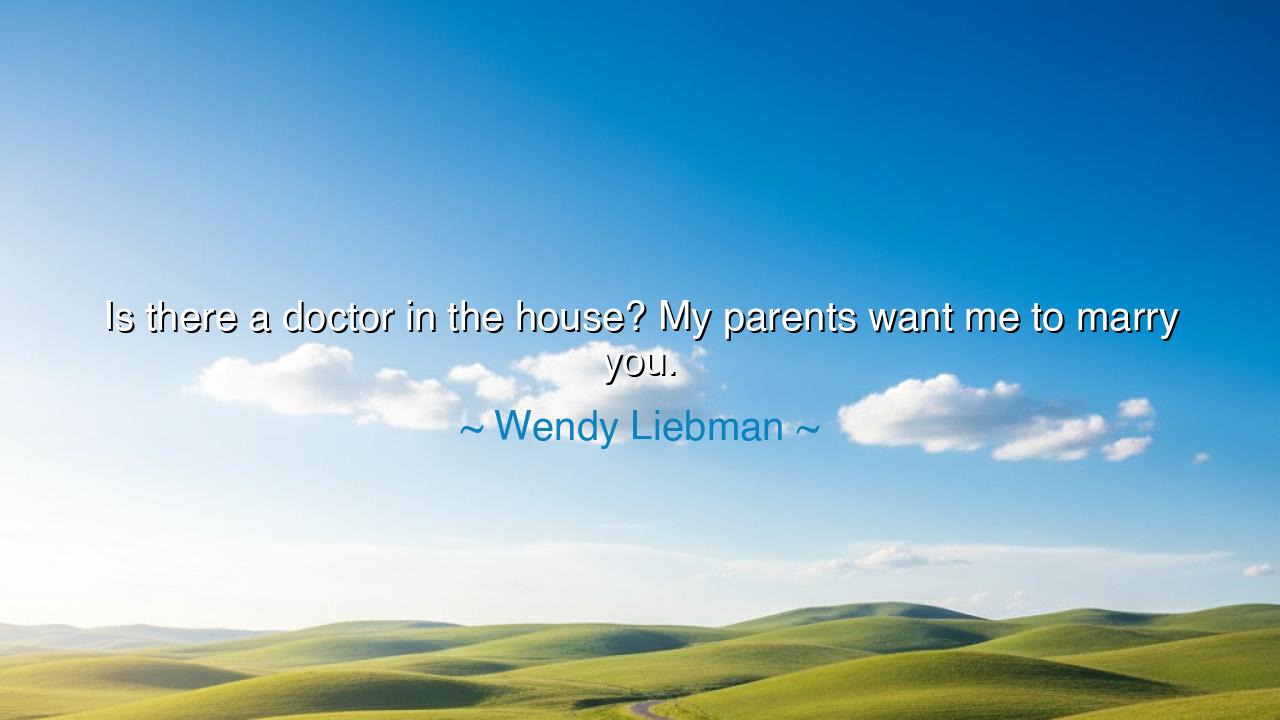
Is there a doctor in the house? My parents want me to marry you.






In the words of Wendy Liebman, “Is there a doctor in the house? My parents want me to marry you.” — we hear a spark of humor that conceals within it the timeless weight of expectation, tradition, and the tender struggle between duty and self. With her wit, Liebman transforms what could be a burden into laughter, yet beneath the jest lies the echo of an ancient truth: that every generation is born into the hopes of the one before it, and must learn how to honor those hopes without being imprisoned by them. Her humor, sharp yet gentle, turns pressure into play — and in doing so, teaches us that even the deepest expectations can be met with grace, understanding, and joy.
The meaning of this quote extends beyond its surface. It speaks to the universal experience of parents who long for security for their children — often seeing in status, education, or profession the promise of stability. The “doctor” becomes a symbol of all that parents value: success, respectability, safety. Yet the child, represented by Liebman’s voice, stands between two worlds — the world of parental dreams and the world of personal desire. The question she asks, laced with humor, reveals the subtle tug of love and pressure: “Is there a doctor in the house?” — not because she seeks healing, but because her parents seek assurance. It is the gentle comedy of generations, repeated endlessly through time.
The origin of this sentiment lies in the fabric of every culture. Across the ages, mothers and fathers have wished for their children to find partners who embody security and honor. In ancient societies, marriages were not merely unions of hearts, but alliances of survival — a way to preserve lineage, wealth, or status. The doctor, in this modern retelling, stands as the heir of the knight, the scholar, the merchant — the person of worth in whom the family sees salvation. Liebman’s jest thus becomes a modern echo of this timeless dynamic, reminding us that while the forms change, the longing behind them remains the same: that those we love might live well, and be safe in the arms of someone the world deems worthy.
We see this pattern in the old stories, too. Consider the tale of Cordelia, the youngest daughter of King Lear. While her sisters showered their father with grand declarations to win his favor, Cordelia spoke simply, saying she loved him “according to her bond; no more, no less.” Her honesty displeased him, and he cast her out — for she did not speak the words he wanted to hear. Yet in time, her truth shone brighter than her sisters’ deceit. Like Liebman’s jest, Cordelia’s quiet defiance reminds us that true love — whether for a parent or a partner — must be guided not by expectation, but by authenticity. To honor our roots without losing our voice is the highest form of filial wisdom.
And yet, there is no bitterness in Liebman’s tone. She does not scorn her parents’ desires; she laughs with them. In her humor lies understanding and affection, for she knows that behind the pressure lies love — imperfect, anxious, human love. It is a parent’s nature to worry, just as it is a child’s nature to seek freedom. The key, she shows us, is to meet those opposing forces not with rebellion or resentment, but with laughter — the ancient balm that turns friction into connection. To make a joke of one’s burdens is not to dismiss them, but to transform them into light.
Her words also reveal the wisdom of self-awareness — the ability to see oneself through the eyes of others and smile. The modern world often teaches us to reject external expectations with anger, yet humor offers another way: to acknowledge, to forgive, and to move forward. When Liebman jokes that her parents “want her to marry a doctor,” she holds a mirror not only to her own experience but to the shared story of many. Through her laughter, she dissolves shame and pressure alike, and invites us to see the humanity in both sides — in the parent who worries, and the child who dreams.
Thus, the lesson of this quote is both tender and timeless: accept the expectations of others with love, but live your life with truth. Know that the desires of your parents, though sometimes burdensome, are born from care, not control. Do not mock their hopes, but do not surrender your soul to them either. Use humor — the ancient bridge between hearts — to turn tension into tenderness. Laugh with those who wish to guide you, even as you walk your own path. In this way, you honor both love and freedom, both the home that shaped you and the journey that awaits you.
And so, my children, remember this: when the world — or your parents — cries, “Is there a doctor in the house?” smile, but do not mistake their call for your command. Let your choices be guided by love, not fear; by gratitude, not guilt. For the truest gift you can give those who raised you is not obedience, but the joy of seeing you whole — a soul who lives fully, laughs deeply, and loves authentically. As Wendy Liebman teaches through laughter, even the heaviest expectations can become light when the heart meets them with humor, grace, and understanding.






AAdministratorAdministrator
Welcome, honored guests. Please leave a comment, we will respond soon